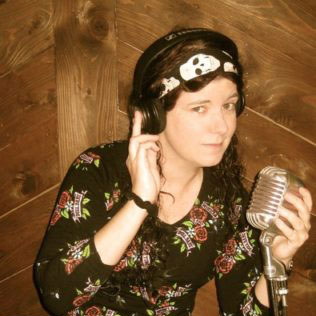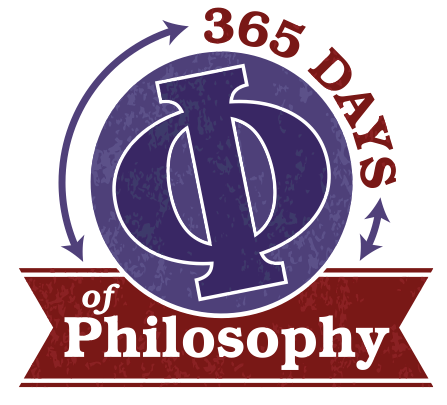Kylie Sturgess teaches philosophy and radio at a Perth university, and produces several podcasts including Token Skeptic, 365 Days of Philosophy and Talk the Talk. She spoke to us about discipline, the difference between podcasting and radio, and the importance of just giving things a go.

What piece of audio has had the most profound effect on you – as a listener, as an audio maker or both?
Probably The Hitchhiker’s Guide to the Galaxy, the first radio play I ever heard. It was funny, atmospheric and since I was an avid reader from a young age, it introduced me to a new genre of storytelling and investigation of issues and ideas. I still use it for teaching.
Where did the idea for the 365 Days of Philosophy come from?
Beginning in 2013, I blogged every day on philosophy – mostly finding useful resources and writing short pieces on topics, suggesting how to approach different aspects such as epistemology, aesthetics, logic and so on. I was studying radio full-time and teaching part-time introductory philosophy and ethics at a local university. At the time, it was too difficult to keep a regular series attached to the [blogging] project while keeping up my regular podcast, Token Skeptic (a series on science, pseudoscience and belief).
This year, as I’m starting my PhD on podcasting and education, I thought it’d be a fun challenge to revisit it and try short summaries, reviews and interviews over the year. I don’t think there’ve been many efforts to try a podcast episode a day, and I love reviewing my notes over the years of teaching the subject and finding new things to suggest.
What is your favourite part of making the podcast?
I enjoy the discipline of planning and scripting the show, and reviewing notes from the previous blogged version; there are new issues and discussions happening all the time, which makes it one of the most enjoyable things to study. Combining it with podcasting – something I’ve done a number of years with Token Skeptic – has been a natural progression.
I enjoy the discipline of planning and scripting the show.
What is the hardest part of producing your podcast?
Reminding myself that it’s something I want to do and experiment with, even though it might not develop much of an audience!
What’s the best thing about working with sound?
Finding out about new developments in storytelling, sound art and investigations, particularly with podcasting – I’m planning on catching Simon McBurney’s The Encounter at the Perth International Arts Festival later this year, for example, and I’m always collecting new ideas and articles to pass onto students and conducting interviews on podcasting.
I was contracted to do a short series for Perth’s RTRFM last year on feminism and work, called A Room of One’s Own. Conceiving the idea, writing the questions and conducting the interviews was a great opportunity. New projects like that are always encouraging.
 What’s the best (or worst) advice you’ve received about podcasting?
What’s the best (or worst) advice you’ve received about podcasting?
Don’t be tied down with making it absolutely perfect. Avoid paralysis of analysis – or needing to have all the right equipment and team to get things done – by just doing it by yourself with what you have, if you really want to give it a try.
I also suggest choosing your colleagues carefully. When I found out early in my career that I was asking permission to be creative, was not given credit for my podcasting work and was being sidelined by people who didn’t care about education, critical thinking and only wanted to be famous, it was a relief to start from the beginning again – on my own, with something that was genuine. Happiness with your work is better than compromising with quality and content for others’ benefit.
It’s okay to screw up and start again if you learned something.
What has been your biggest lesson as a producer so far?
In radio – produce as if it is you who is going to be taking the run-down to the studio and presenting it live to air. In podcasting – it’s okay to screw up and start again if you learned something.
Do you interact with your audience, or receive feedback or criticism about your work?
I was an early adopter of social media and regularly post on a number of networking sites, and have a Patreon page for supporters to donate to my podcasting. I’m probably my own worst critic, however.
If you could go out to dinner with any audio maker, who would it be – and what would you talk about?
It’s a pity I never got to meet Douglas Adams, as I’m interested in audio storytelling and regret we never got to see his work develop further. Would he have been into science and environmentalism as a podcaster, as well as a writer?
Other than that, I’m happy to talk to anyone who can spare the time to tell me why and how they do what they do with sound.
What are you listening to at the moment?
I have about three (slowly dying) iPods and a phone and iPad full of shows, segments, clips. On my phone next to me, I currently have Sami Shah’s documentary series on Islam for ABC RN’s Earshot; some recordings of panels from past Third Coast International Audio Festivals; WNYC’s ‘The Ring and I: The Passion, The Myth, The Mania‘ (yes – from Jad Abumrad’s ‘German forest‘ story!), and two documentaries on Kate Bush and J.K. Rowling that I sometimes listen to with the video turned off.
What’s your favourite Australian podcast, and why?
I enjoy Talk the Talk, and have done long before I got involved with the show – if you find yourself shouting out your views along with the episode while out jogging with earphones in, you know that you’re involved with what’s going on!
What do you think is unique about Australian audio?
Australia is an interesting landscape because there’s a division between podcasters and radio creators – for quite some time the two have been fairly separate, and there’s only recently been a merging of the two, and discussion on what is the future for both.
Podcasting is a little wilder and looser than radio. It isn’t just ‘radio shows put online’ – and I can understand the resistance to having radio organisations step in and seemingly set expectations of what can and should be done in podcasting. It’s going to be an interesting few years ahead of us, and I think we’re one of the few countries actually admitting the similarities and differences and investigating it further.
What’s next for you as a producer?
Working on my PhD and the podcasts 365 Days of Philosophy, Token Skeptic and Talk the Talk, while teaching an introduction to radio at Murdoch University and presenting at the community radio station RTR FM. I think that’s enough to keep me busy for a little while.